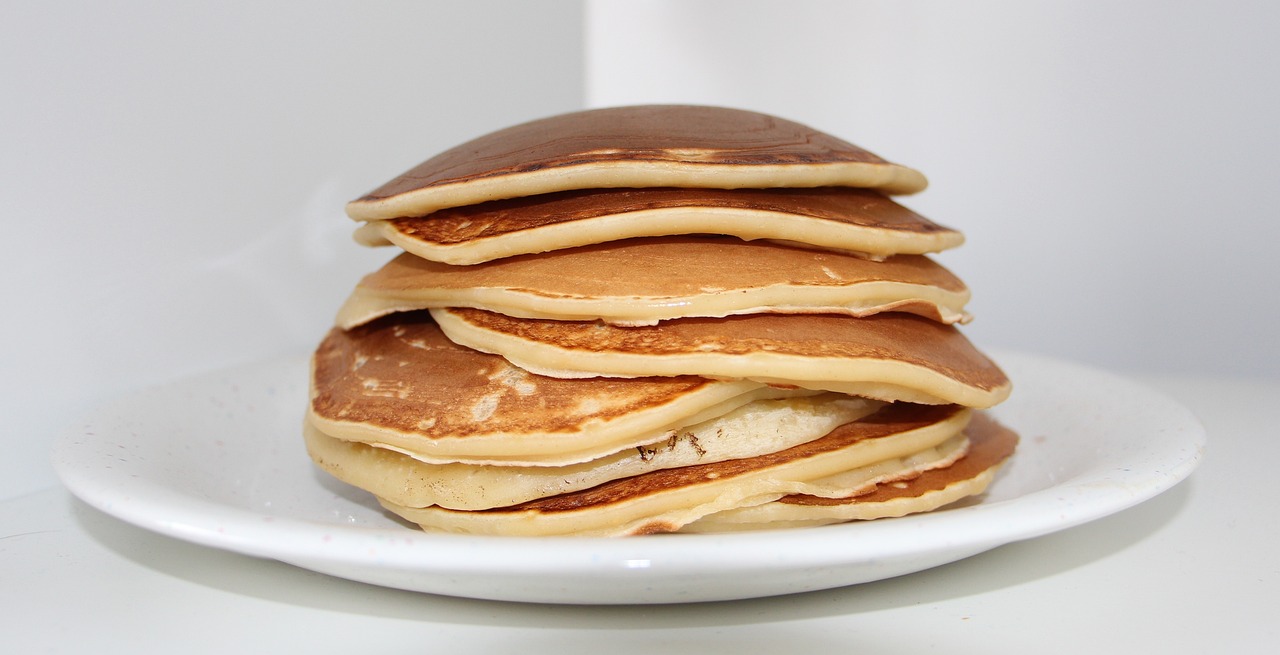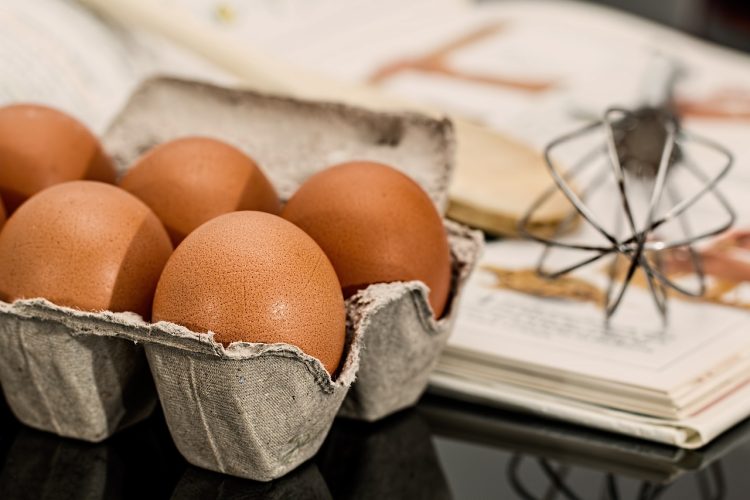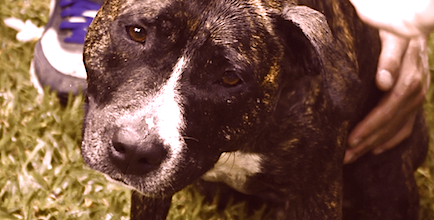Can Dogs Eat Pancakes? A Comprehensive Guide
A staple breakfast food for humans, but can dogs eat pancakes too? Here’s some insight into why they’re not a great snack for dogs.

- Yes, dogs can eat plain pancakes in small amounts, but they offer little nutritional value.
- High in carbs and fats, pancakes can contribute to weight gain, and toppings like syrup, butter, or artificial sweeteners can be harmful.
- For a healthier treat, opt for dog-friendly snacks like fruits or homemade treats with simple, safe ingredients.
If you have a pet, chances are you’ve thought about whether or not to share your human food with your furry friend. Pancakes, a popular breakfast food, often pique the interest of our canine companions leading many to ask: Can dogs eat pancakes? While it may be tempting to sneak them a few bites, it’s crucial to understand the risks of pancakes for dogs. This article explores whether dogs can eat pancakes, the potential risks involved, and how to safely include pancakes in your dog’s diet, if at all.

Don’t leave your pet’s safety to chance
Sign up for Petful recall alerts today.

Are Pancakes Good for Dogs?
While pancakes are not toxic to dogs (provided they do not contain harmful ingredients), they offer no real nutritional benefit and are best given sparingly, if at all. Choosing healthier, dog-specific treats can contribute to a balanced diet and be overall better for your individual dog’s dietary needs. If you want to offer your pup some of your pancake breakfast, ensure the pancake recipes do not contain harmful ingredients for dogs and that it is plain, with only dog-friendly toppings, if any. Keep these health considerations in mind when contemplating offering a small piece of plain pancake to your pup:
Basic Pancake Ingredients:
- Flour and Eggs: Generally safe for dogs, but offer little nutritional benefit.
- Milk: Many dogs are lactose intolerant, so milk could cause digestive upset.
- Butter: High in fat, which can lead to obesity and related health issues like diabetes in dogs.
Sugar and Sweeteners:
- Regular sugar can lead to dental problems and obesity in dogs.
- Artificial sweeteners, particularly xylitol, are toxic to dogs and can cause serious health issues such as liver failure and hypoglycemia.
- Foods high in fat and with too much sugar can lead to pancreatitis, a serious condition in dogs.
Additives and Toppings:
- Many pancake toppings are not dog-friendly and contain toxic foods. For example, chocolate and raisins are toxic to dogs, and excessive syrup can lead to sugar overload and obesity.
- Even seemingly healthy toppings like blueberries should be given in moderation.
Alternatives to Pancakes
For a healthier treat, consider alternatives that are more suitable foods dogs can have:
- Homemade Dog Treats: Use dog-friendly ingredients to make treats at home.
- Fruits and Vegetables: Many dogs enjoy fruits and vegetables like carrots, apples (without seeds), and blueberries, which offer more nutritional benefits and fewer calories.
- Commercial Dog Treats: Choose treats or dog biscuits formulated for dogs, which will be free of harmful additives and more nutritionally balanced.
How Many Pancakes Can Dogs Eat?
When it comes to feeding pancakes to dogs, it’s important to prioritize moderation and caution, especially since pancakes do not provide significant nutritional benefits and can contain ingredients that may not be ideal for dogs. Here’s a guideline on how much pancake you can likely offer to dogs based on their size:
- Extra Small Dogs (<10 lbs): A couple of small bites of plain pancake, no bigger than a dime size and not frequently.
- Small Dogs (10-25 lbs): One small bite of plain pancake about the size of a quarter each unfrequently.
- Medium Dogs (25-60 lbs): One or two small pieces of plain pancake in moderation.
- Large Dogs (60-100 lbs): Up to three small pieces (about the size of a quarter) and ensure its plain.
- Giant Dogs (100+ lbs): Three to four small pieces of plain pancake (about the size of a quarter each) in moderation.
These guidelines are conservative to ensure the health and well-being of your dog. Always consult with your veterinarian before introducing new human foods into your dog’s diet.
Remember, if you’re going to offer pancakes ensure that they are plain without any butter, syrup, chocolate, xylitol, or other potentially harmful toppings. Be observant for any signs of allergies or adverse reactions, especially if feeding pancakes for the first time. Only offer dogs pancakes in very small amounts to ensure treats like pancakes do not constitute more than 10% of your dog’s daily caloric intake, as the primary diet should be well-balanced and formulated for dogs.

Nutritional Considerations for Pancakes
While none of the basic ingredients in pancakes are toxic to dogs (unless they have specific allergies), they don’t offer significant nutritional benefits for dogs either. Here’s a breakdown:
- Flour: Generally harmless but offers little nutritional value to dogs.
- Eggs: A good protein source for dogs but only when cooked plain.
- Milk: Some dogs are lactose intolerant, so milk could cause digestive upset.
- Sugar and Sweeteners: Sugar is unhealthy for dogs and can lead obesity and dental problems, while artificial sweeteners like xylitol are toxic.
Preparation Tips
If you decide to give your pup pancakes, here are a few tips to ensure it is done safely:
- Plain is Best: Serve pancakes plain without any butter, sugar, syrup, or toppings.
- Go for Whole Grain: Choose whole grain or whole wheat pancakes as they are healthier than those made with refined flour.
- Moderation is Key: Keep pancake treats infrequent and in small quantities. Pancakes should not make up a significant part of a dog’s diet.
- Watch for Allergic Reactions: Monitor your dog for any signs of an allergic reaction or food intolerances after eating pancakes, especially if it’s their first time.
- Consult Your Vet: Always consult with your veterinarian before introducing new foods into your dog’s diet, especially if your dog has preexisting health conditions.
Allergies
Dogs can potentially develop allergies to several common ingredients found in pancakes. Here are some ingredients that might trigger allergic reactions in some dogs:
- Wheat Flour: Many dogs are allergic to wheat. Symptoms can include itching, skin infections, and gastrointestinal upset.
- Eggs: Some dogs are allergic to eggs, which can cause skin irritation, gastrointestinal problems, and respiratory issues.
- Milk: Lactose intolerance is common among dogs, and while it’s not an allergy, it can cause similar symptoms such as diarrhea and vomiting. True milk allergies can also occur, leading to more severe reactions and have a bad effect on a dog’s stomach amongst other serious health issues.
- Butter: Dogs can be allergic to dairy products, including butter, which can contribute to skin and digestive issues.
- Additives: Pancakes often contain additives like preservatives or flavor enhancers that some dogs might be allergic to.
If your dog shows signs of discomfort, itching, swelling, or digestive upset after eating pancakes, it’s important to consult your veterinarian. They can help determine the specific cause of the allergy and recommend expert advice on appropriate treatment or dietary adjustment.
In conclusion, while most dogs can eat plain pancakes in small amounts, they offer little nutritional benefit and can pose several health risks. Owners should feed pancakes sparingly and opt for plain, simple dog-friendly recipes if they choose to off any to their pets. Always consider healthier snack options to ensure your dog maintains a balanced diet.
Remember, each dog is unique, and what works for one may not work for another. Always prioritize your dog’s individual dietary needs and health, and consult your vet when you’re unsure about dietary changes.
Frequently Asked Questions (FAQ)
Can Dogs Eat Pancakes With Syrup?
No, do not feed dogs pancakes with syrup as the sugar content in syrup is not good for dogs and can lead to obesity. Additionally, some syrups, especially sugar-free syrups, may contain xylitol which is toxic for dogs. In general, if you choose to offer your pup some pancakes, only give it to them plain, without syrup or other possibly harmful toppings.
Can Dogs Eat Pancakes With Butter?
Butter is another topping that is not very good for dogs. Butter adds excess fats and calories, which can contribute to weight gain and potentially lead to pancreatitis. Additionally, butter often contains salt and sometimes artificial additives, which are not good for a dog’s health. If you choose to give your dog a piece of pancake, it should always be plain and given in very small quantities as an occasional treat, not as a regular part of their diet.
Can Dogs Eat Pancakes With Peanut Butter?
Peanut butter is a risky topping for dogs because certain types of peanut butter contain xylitol, which is highly toxic. Always check the ingredients before you offer new foods to your pup and if you do decide to offer them a small amount of plain pancake to your dog ensure it is a dog-safe recipe and the ingredients are non-toxic.
Recipe
Here’s a simple and dog-friendly pancake recipe that you could make for your furry friend. This recipe avoids ingredients that are commonly found in human pancakes, which may not be suitable for dogs. Be sure to consult with a vet before introducing new foods like pancakes into your dog’s diet to ensure its good choice for their individual health.
Ingredients:
- 1 cup of whole wheat flour (or substitute with oat flour for gluten-sensitive dogs)
- 1 teaspoon of baking powder (ensure it’s aluminum-free)
- 1 egg
- 1 cup of water
- 1 tablespoon of unsweetened applesauce or mashed banana for a hint of sweetness
Instructions:
- In a large bowl, whisk together the whole wheat flour and baking powder.
- Add the egg, water, and applesauce or mashed banana to the dry ingredients. Stir until the mixture is smooth and free of lumps.
- Heat a non-stick skillet over medium heat. You can lightly grease the pan with a small amount of coconut oil to prevent sticking.
- Pour small amounts of batter onto the heated skillet to form mini pancakes—ideal for dog-sized bites. Cook for about 2 to 3 minutes on one side, or until bubbles form on the surface and the edges appear dry.
- Flip the pancakes and cook for an additional 1 to 2 minutes on the other side until golden brown.
- Allow the pancakes to cool completely before serving to your dog to avoid any risk of burning their mouth.
- Offer your dog only one or two small pancakes depending on their size, as a special treat rather than a regular meal. Always check with your vet first to ensure the ingredients are safe for their specific health.
Curious about what other foods dogs can eat? Check out these related articles below:







